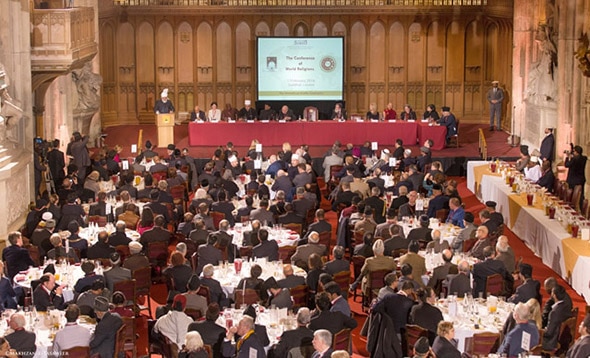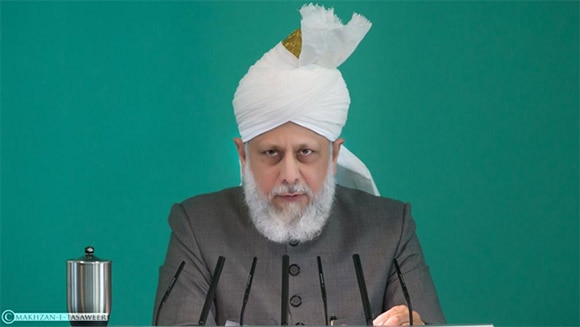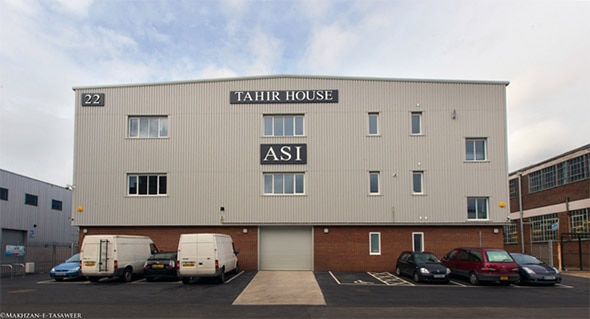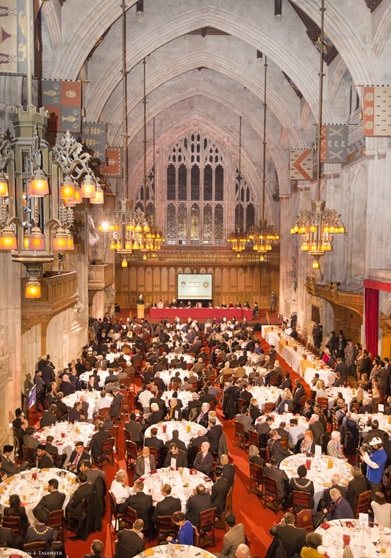 The World Head and Fifth Khalifa of the Ahmadiyya Muslim Community, Hazrat Mirza Masroor Ahmad, delivered the keynote address at the historic ‘Conference of World Religions’ on 11 February 2014.
The World Head and Fifth Khalifa of the Ahmadiyya Muslim Community, Hazrat Mirza Masroor Ahmad, delivered the keynote address at the historic ‘Conference of World Religions’ on 11 February 2014.
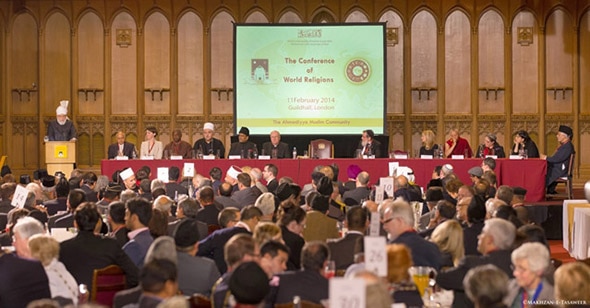
The conference was organised by the Ahmadiyya Muslim Community in the UK, as part of its centenary celebrations, at the famous Guildhall in the City of London. The theme of the much anticipated event was ‘God in the 21st Century’.
Around 500 delegates attended the conference, including faith leaders from various countries, politicians, government officials, members of the diplomatic corps, academics and representatives of various NGOs.
The conference also received messages of support from Her Majesty, Queen Elizabeth II, His Holiness the Dalai Lama, Prime Minister David Cameron and several other dignitaries.
During the event the various faith leaders considered what role religion could play in today’s world and whether religion continued to be a force for good. The keynote address delivered by Hazrat Mirza Masroor Ahmad sought to answer these questions in light of Islam’s true teachings.
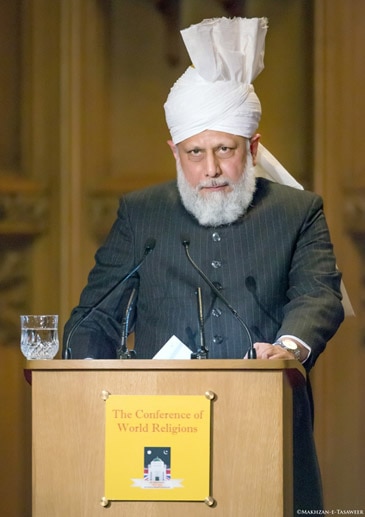
The Khalifa highlighted that all the major religions of the world taught the worship of God and love and compassion for mankind in their original form. His Holiness said that if these original teachings were upheld today it would lead to a harmonious society, free from conflict and war. He also condemned governments across the world for prioritising defence and military spending above and beyond social welfare and humanitarian projects.
Speaking about how the Founder of Islam, the Holy Prophet Muhammad (peace and blessings be upon him) responded to the most horrific and sustained persecution, Hazrat Mirza Masroor Ahmad said:
“When the Holy Prophet (peace and blessings be upon him) gained victory over the sworn enemies of Islam, who in the past had left no stone unturned in their efforts to destroy the religion, he responded with peace and forgiveness.”

Hazrat Mirza Masroor Ahmad said there was no contradiction between Islam’s peaceful teachings and the fact that some wars were fought during the early years of Islam. He said that those wars fought had been defensive wars, fought not only to protect Islam, but also to protect the people of all religions.
Citing the example of the Battle of Badr, where 300 ill-equipped Muslims defeated a much stronger army comprising 1,000 soldiers, Hazrat Mirza Masroor Ahmad said:
“Where on the one hand this was a victory for Islam, it was also a timeless triumph for every person who desires for peace to be established in the world. It was a victory for every person who desires for human values to always be preserved and it was a victory for all people who believe religion to be a force for good and for establishing peace in the world.”
His Holiness clarified that any wars fought during the era of the Holy Prophet Muhammad (peace and blessings be upon him) or his four Rightly Guided Successors were entirely defensive in nature and fought only to “end cruelty” and“establish peace”. However, later wars fought during the eras of certain Muslim monarchs were fought to expand kingdoms and gain power.
Commenting on this, Hazrat Mirza Masroor Ahmad said:
“Those wars fought to expand kingdoms and to increase power were not in any way fought in accordance with the teachings of Islam as taught by the Holy Quran.”
Hazrat Mirza Masroor Ahmad said that Ahmadi Muslims believed the Founder of the Ahmadiyya Muslim Community, Hazrat Mirza Ghulam Ahmad of Qadian, to be the Promised Messiah and Mahdi and that he had come to end all religious wars, to bring mankind towards its Creator and to draw the attention of the world towards fulfilling the rights of one another.
Hazrat Mirza Masroor Ahmad appealed for the people of all religions to work together towards creating a just society based on mutual respect and tolerance.
Hazrat Mirza Masroor Ahmad said:
“I hope and pray that we, who are the representatives of different faiths and religions, and who have gathered here today to practically demonstrate these loving teachings, all strive towards worshipping the One God, by treating His Creation with justice and by fulfilling their due rights.
Certainly these are the original teachings of all religions. We should utilise all of our resources and capabilities to foster a better society, to help God’s Creation and to spread love, affection and peace at every level. The urgent and critical need of the world today is to establish peace and faith in God.”
His Holiness called on the leaders of all nations to prioritise social welfare above and beyond unnecessary militarisation.
Hazrat Mirza Masroor Ahmad said:
“The urgent and critical need of the world today is to establish peace and faith in God. If the world understood this reality then all countries, whether large or small, would not, in the name of defence spending, allocate millions and billions of dollars to expand their military capabilities. Rather, they would spend that wealth to feed the hungry, to provide universal education and to improve the living standards of the developing world.”
The Khalifa concluded by reiterating the fact that God is a “Living God” who continues to listen to the prayers of mankind.
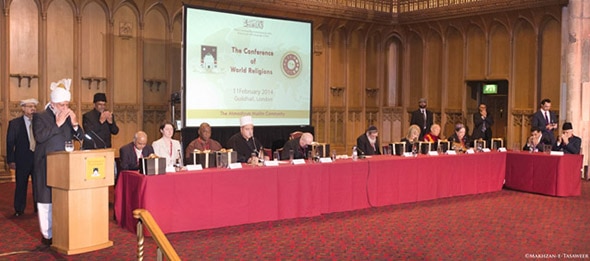 Hazrat Mirza Masroor Ahmad said:
Hazrat Mirza Masroor Ahmad said:
“In order to protect ourselves and to save mankind we need to turn towards God Almighty and we need to attach ourselves to that Living God who did not forsake the Prophet Moses and his people and nor did He forsake the Prophet Jesus and his disciples. Nor have true Muslims been deprived from attaining the blessings of God and seeing their prayers accepted.”
Earlier in the evening, a range of faith leaders and dignitaries took to the stage to highlight their respective beliefs. All of the speakers also took the opportunity to express their gratitude to the Ahmadiyya Muslim Community for organising such an event that promoted inter-faith dialogue.
Rabbi Jackie Tabick, Joint President of the World Congress of Faiths said:
“We should be supportive of one another in our spiritual lives and be true to our own faiths whilst understanding and valuing the oneness amongst us.”
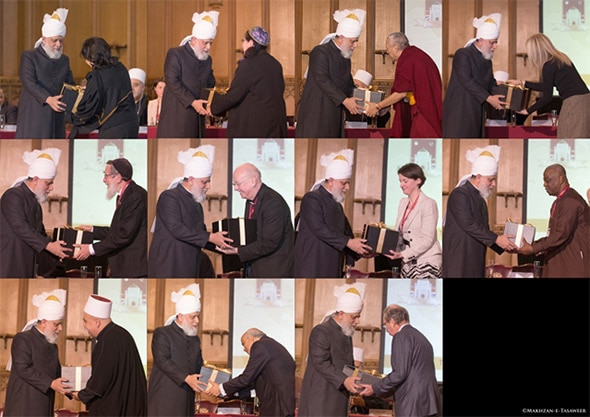
Umesh Sharma, Chairman of the Hindu Council UK quoted sacred Hindu texts highlighting the peaceful teachings of the Prophet Krishna. He also said that Hazrat Mirza Masroor Ahmad “leads by example” in his efforts to develop peace in the world.
Rt Hon Dominic Grieve QC MP, the Attorney General said:
“The right of individual conscience is the basis of everything and so it is essential that people are free to practice their religions without coercion of any kind. I would also like to thank Your Holiness (Hazrat Mirza Masroor Ahmad) and the Ahmadiyya Muslim Community for its astonishing contribution to the United Kingdom.”
Geshe Tashi Tsering, read a message from His Holiness the Dalai Lama, which said:
“Virtues of love and altruism are the basis of all religions and so a respect for all religions is essential. All religions are a means of inner-peace. I give my full heartfelt support to the Conference of World Religions.”
Prof Kwaku Danso-Boafo, High Commissioner of Ghana read a message from the President of Ghana, which said:
“This Conference will be a means of helping to bring peace in the world.”
Sheikh Moafaq Tarif, Spiritual Head of the Druze Community of Israel said:
“All the great religions agree on the Unity of God… Let us all come together and join hands together against violence.”
Dr Katrina Lantos-Swett, Vice-Chair United States Commission on International Religious Freedom, said:
“I am always uplifted and moved by the spirit amongst Ahmadi Muslims. The Ahmadiyya Muslim Community is living proof that religion can be a means of peace.”
Dr Lantos-Swett also acknowledged the role of the late Sir Chaudhry Zafrullah Khan Sahib in negotiating the United Nations Declaration of Human Rights and the fact that he signed it on behalf of the State of Pakistan.

Baroness Berridge, Chair of the UK Parliamentary Group on International Religious Freedom outlined the work of the Parliamentary Group and said that its objective was to “prick the conscience of Governments” towards establishing religious freedom.
Archbishop Kevin McDonald, representing the Roman Catholic Church, spoke of the World Day of Prayer for Peaceorganised by the late Pope John Paul II in 1986 and said that “today’s conference is another moment of the coming together of the people of different religions in peace and justice.” The Archbishop also read a message of support from Cardinal Peter Turkson, the President of the Pontifical Council for Peace and Justice.
The Rt Hon Baroness Warsi, Senior Minister of State at the Foreign Office, said:
“It is testament to the openness, the pragmatism and the humility of the Ahmadiyya Muslim community that their flagship global event celebrated all faiths.”
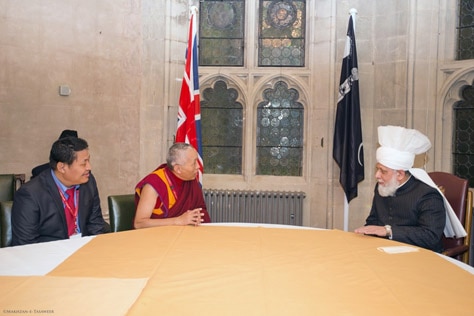
Rabbi Professor Daniel Sperber, representing the Chief Rabbi of Israel addressed Hazrat Mirza Masroor Ahmad as the ‘Khalifa of Islam’ and said:
“Humankind in the world are not its masters but its custodians. Let us return to the simple notion of faith and the sanctity of God.”
The World Conference concluded with a silent prayer led by Hazrat Mirza Masroor Ahmad. Earlier in the evening, His Holiness held a series of private meetings with dignitaries and delegations from various countries and he also led the Maghrib and Ishaa prayers at the Guildhall.
